#Food Systems
Text
"A global shift to a mostly plant-based “flexitarian” diet could reduce greenhouse gas emissions and help restrict global heating to 1.5C, a new study shows.
Previous research has warned how emissions from food alone at current rates will propel the world past this key international target.
But the new research, published in the Science Advances journal, shows how that could be prevented by widespread adoption of a flexitarian diet based around reducing meat consumption and adding more plant-based food.
“A shift toward healthy diets would not only benefit the people, the land and food systems,” said Florian Humpenöder, a study author and senior scientist at the Potsdam Institute for Climate Impact Research, “but also would have an impact on the total economy in terms of how fast emissions need to be reduced.” ...
The researchers found that adopting a flexitarian diet could lower methane and nitrous oxide emissions from agriculture and lower the impacts of food production on water, nitrogen and biodiversity. This in turn could reduce the economic costs related to human health and ecosystem degradation and cut GHG emissions pricing, or what it costs to mitigate carbon, by 43% in 2050.
The dietary shift models also show limiting peak warming to about 1.5C can be achieved by 2045 with less carbon dioxide removal, compared with if we maintain our current diets.
“It’s important to stress that flexitarian is not vegetarian and not vegan,” Humpenöder says. “It’s less livestock products, especially in high-income regions, and the diet is based on what would be the best diet for human health.”
In the US, agriculture accounts for more than 10% of total GHG emissions. Most of it comes from livestock. Reducing meat consumption can free up agricultural land used for livestock production, which in turn can lower methane emissions. A potent greenhouse gas, methane is mainly expelled from cows and other animals raised for livestock. Animal production is the primary contributor to air quality-related health impacts from US food systems.
“This paper further confirms what other studies have shown, which is that if we change our diets to a more flexitarian type, we can greatly reduce greenhouse gas emissions,” said Jason Hill, a professor in the University of Minnesota’s department of bioproducts and biosystems engineering.
According to the study authors, one way to achieve a shift toward healthier diets is through price-based incentives, such as putting taxes on the highest-emitting animal products, including beef and lamb. Another option is informing consumers about environmental consequences of high meat consumption."
-via The Guardian, March 27, 2024
#flexitarian#vegetarian#vegan#environment#environmental news#agriculture#big agriculture#beef#methane#air pollution#greenhouse gasses#carbon emissions#1.5 degrees#climate action#climate hope#good news#hope#food#food systems
144 notes
·
View notes
Note
hello! I've just found your blog and that's AMAZING, but I have a question: what do you think about industrial food? it's super low quality, and furthermore, they produce a lot of trash as plastic (unnecessary) packaging! It would be easier just to say "starting eating organic food", but for poor people, buying grapes or apples, even not organic, costs more than buying cookies full of fat, sodium and carbohydrates (not talking about all the chemicals). I personally, think about non conventional food plants as an alternative since most of them are super resistant to weather changes and easy to rise. I wanna know what you think about
Hi! Thanks for getting in touch. The long and short of it is, I hate industrialised farming. It pollutes the air, soil and water, poisons and impoverishes farmers, increases the likelihood of zoonotic pandemics, reduces the genetic diversity of plants and encroaches upon wildlife territories. We need a massive return to local, small-scale regenerative agriculture if we are to feed everyone and equitably share the earth with other species. But you’re right, it has to be done in a way that’s just and fair for people who can currently only afford plasticked, pesticided and processed food, as well as making a living for farmers. We’re all on the same side here, but people often don’t realise that. I also think we need to massively diversify our food plant range - a system that relies on just a few staple crops is insanely vulnerable, especially with more and more extreme weather coming our way. So many plants I was raised to think of as ‘weeds’ are not only edible but highly nutritious and often medicinal. Where are the dandelion farmers? The mycologists selling turkey tails? And foraging should be taught in all schools so kids can feed themselves in the wild and pass these skills on to future generations. As with most climate solutions, I don’t think it’s an either/or - I’d welcome pretty much any solution as part of a wider melting pot of alternatives. The only thing I won’t budge on is that we have to change, because the way we in the North and West farm right now just isn’t sustainable.
#solarpunk#hopepunk#cottagepunk#environmentalism#social justice#community#farming#food systems#organic#agriculture#agroecology#regenerative farming#plants#foraging#diet#ask#fuck industrial farming
22 notes
·
View notes
Text
Growing food is a relationship. Part of that relationship is compost.
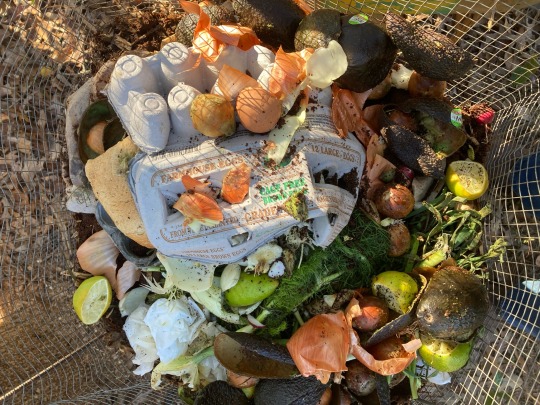
#compost#food systems#atlanta urban ag#food access#soil food web#soil health#food sovereignty#community composting systems#raised beds#vermicomposting#visionary growing solutions#maurice small
53 notes
·
View notes
Text
Food Literacy for All Showcase

"Do you know why the US Food Administration was created? Nope, it's not for public health reasons! Rather, it was created on August 17, 1917 by executive order primarily to provide food for the Allies in Europe during World War I. The US launched a rigorous campaign, greatly humanitarian in nature, onboarding roughly half the families in the nation to take on food pledges with weekly meatless, sweetless, porkless, and wheatless days to ship those foods to soldiers and starving civilians in Europe. This campaign demonstrates how the lack of overindulgence in food sympolizes patrioatism in the US during WWI."
Spotlight on food history posters prepared by students enrolled in the Food Literacy for All (Winter 2024), a community-academic partnership course hosted by the University of Michigan Sustainable Food Systems Initiative. Read more!
#special collections and archives#special collections libraries#special collections#libraries and archives#archival collections#archives#archival research#food history#food literacy#food systems#sustainable#sustainability#sustainable food#sustainable food systems#libraries#students#course work#instruction#jblca#janice bluestein longone#american culinary history#janice blustein longone culinary archive#culinary archives#culinary history#culinary
12 notes
·
View notes
Text
This photo is of 1/10th of the compost dug up for our garlic beds this winter.
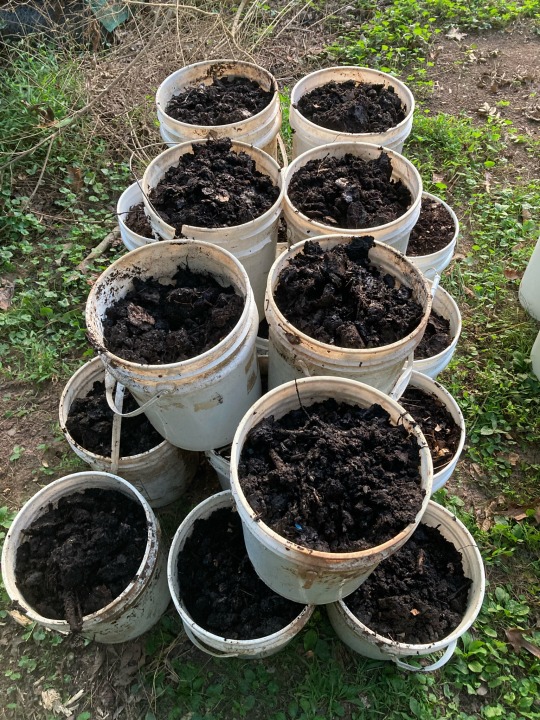
#compost#food access#atlanta urban ag#garlic beds#winter prep#bed preparation#food systems#soil health#food sovereignty#seed saving#garlic
37 notes
·
View notes
Text
this really cool article - https://www.bu.edu/bhr/2015/02/01/780/
talks about the history, particular England, and its grocery delivery system over the decades. How originally, you would send a list to a shop keeper for goods like Flour, sugar, milk, etc.. And have it delivered.
Than the Cash and carry system, during the depression kicked off in order to save on delivery costs. Basically putting all the work of Picking, sorting, loading, and transporting onto the individual rather than the business.
But god, in a current system where you have something akin to a post officer do this?? It would really help decentralize cars as primary mode of transport if you didn't have to do all the work yourself.
It's draining, its manual labor in its own right. Its not accessable. Its not efficient. It creates a competition on food that isnt necessary mostly for Perfect Produce. Lately we are starting to return to this threw delivery systems like Instacart (Gag) who exploit workers and customers for profit.
But again, imagine for just a moment what this COULD look like. A neighborhood wide grocery drop off day like garbage pick up or the mail. Imagine having a day you knew was every week that you'd fill out a list and someone shows up with that sugar you where low on bc you wanted to make cookies. Imagine having the SAME rotation of ppl so you could know them. Imagine how different meal planning becomes, how communical it could be. How your neighbors might have over estimated how much tomatoes they go threw and ordered more so they brought you salsa.
#accessability#food systems#anarchist#anticapitalism#Solarpunk#community#food mention#rants#long post#feel free to add your own ideas I am just obsessed with it bc it's the best option I know of atm#someone discuss this with me#hopepunk#gardening#urban gardening#grocery
139 notes
·
View notes
Note
Def a good idea to delete theculturedmarxist’s stuff, he’s also a big-time propagandist/genocide denier type. It sucks that some tankies have gotten bigger platforms recently by strike blogging.
But yeah the banana thing is insane, I *think* the original poster was using it as an example of the fact that a more just society in the US is necessarily going to be a less convenient one because convenience often comes at the expense of (domestic and international) labor exploitation, and “non-domestic crops being available year-round” is an example of a luxury that came out of said exploitation, which is A Point (though I might’ve picked something like Amazon same-day delivery to argue it…)
But then people ran with it and made it about either How Do We Stop Big Banana Through Socialism or Here’s How Bananas Can Still Win. Both at the dehumanizing expense of now-theoretical Latin American laborers of course 🙃
Oh shit that's what's happening? Tankies coasting in on strike blogging?? Gdi.
Yeah I think that was the original point too. The thing is, that US leftists keep centering US consumer demand in everything, like the entire system of global labour and resource exploitation by multinational conglomerates, aided and abetted by the IMF and World Bank and the entire colonial power matrix, can be solved by yelling at enough people about their consumption. For people who are so obsessed with class, it seems to consistently escape them that Global North consumers are also exploited and disempowered by the same oligopolies and monopolies that pay producers pennies on the dollar and sell for prices that smaller and entry-level companies can't compete with. Even as an example, bananas in the US are priced way lower than what's profitable, just to keep a monopoly of consumers. And because so many companies in the West don't pay working class people a fair wage, they have to consume the cheapest, most convenient food stuffs. So when you talk about people reducing consumption of bananas, you're asking people dependent on the cheapest nutrient sources to bear the biggest loss.
This is exactly what we mean by "no ethical consumption under capitalism". It doesn't mean we give up on the entire issue, it means that the systems of production cannot be manipulated by consumer boycotts and individual ethics. Even if one product was taken off the shelves, whatever supplanted it would be just as unethical for some group of people. It means that the solutions need to be implemented top-down, not bottom up. Global North governments need to better regulate corporate behaviour, prioritise the well-being of workers and ecological chains involving production and transport, prevent monopolies by regulating prices, and encourage and incentivize local food supply networks. And also, as some from Colombia said in a reblog about the cocaine industry, economic stress must be taken off developing nations by forgiving their IMF and World Bank loans so that they can invest the profits from their export industries in reforming agriculture and social welfare systems.
I literally do not understand why, when people directly impacted by these conditions have clear and cohesive demands and action plans, Western liberals and leftists need to come up with these completely abstract, impractical, ego-centric bullshit to create endless discourse over. They don't actually care about engaging with activists, grassroots organizations and unions in the Global South, because that involves interrogating their own paternalism, privilege and bias, and narrows the scope for the clout-chasing dunk economy.
#knee of huss#asks#anon#banana cocaine discourse#western leftists#white liberals#tankies#global south#capitalism#ethical consumption#food systems#paternalism#worker exploitation#ecological conservation#climate collapse
29 notes
·
View notes
Text
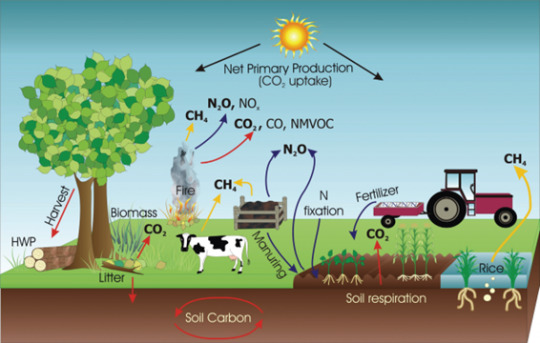
I love science. But also, I can clearly see how it is the western man’s explanation of explicit indigenous knowledge. ESPECIALLY in agriculture and food systems. Isn’t it quite interesting to think about how regenerative agriculture was THE way of living. We’ve strewn so far from this form of food production that now rich white women with masters degrees and inherited land get to teach others “regenerative agriculture” for profit. It irritates me that our culture (mostly white culture) needs the chemical, biological, physical, scientific proof that something works when oral traditions have been tried and true on this continent for 10,000 years. Is the scientific method a means of distraction so big ag, big pharma, big oil, and big chem can make a profit?
#the circle of capitalism#western science#indigenous knowledge#same language#agriculture#regenerative agriculture#indigenous voices#food systems#native rights#sustainability#fuck capitalism#life#wicked witch#green anarchy#the wicked witch of the east#why does tumblr hate me#big ag#small ag#circular#solarpunk#profit#profit to the people#united we stand
44 notes
·
View notes
Text
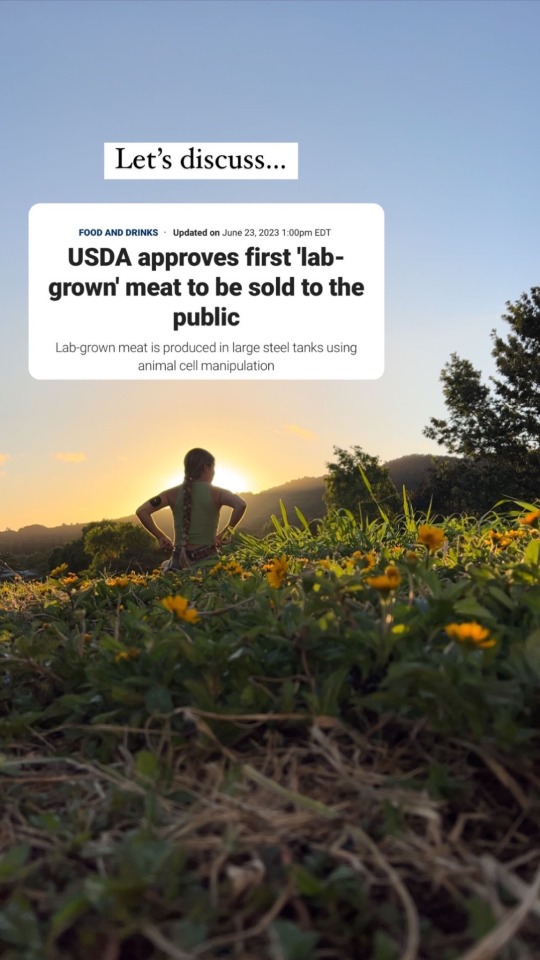
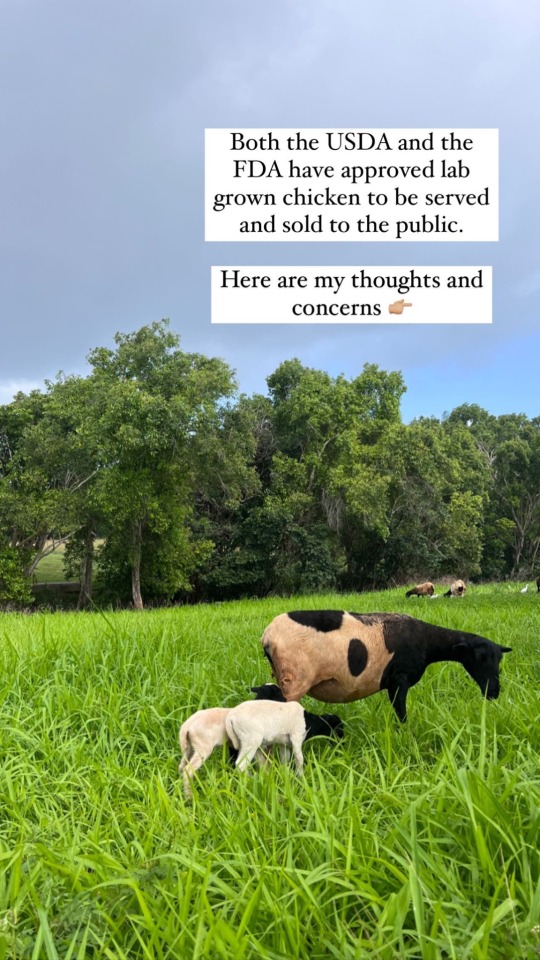

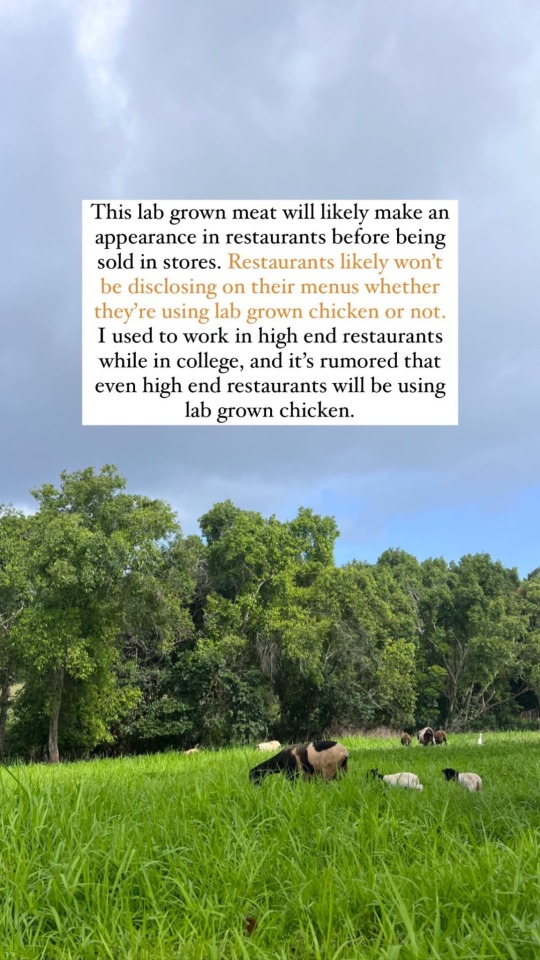

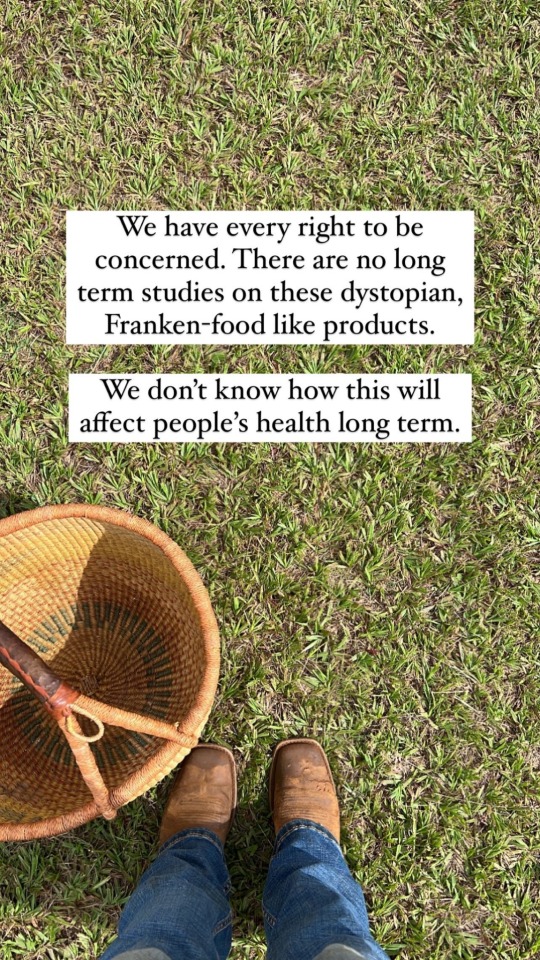

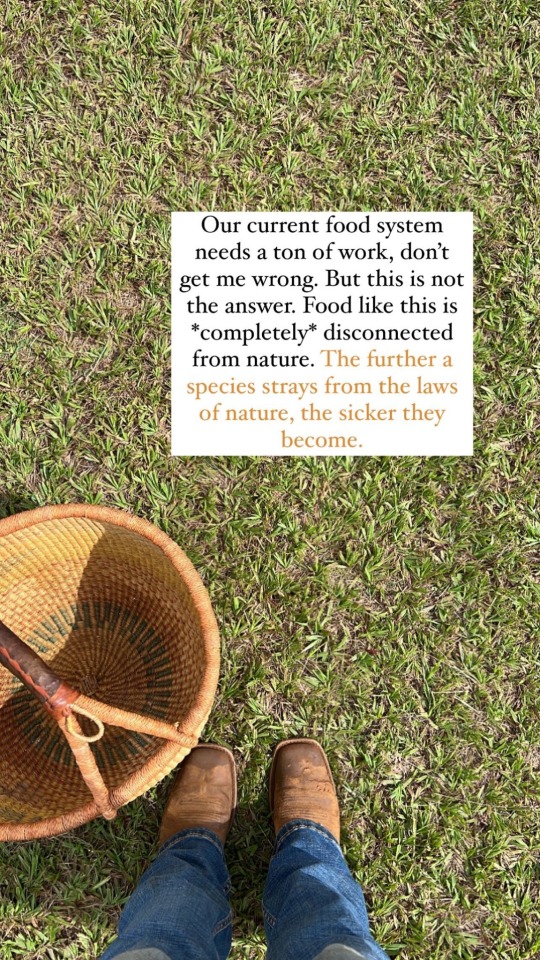

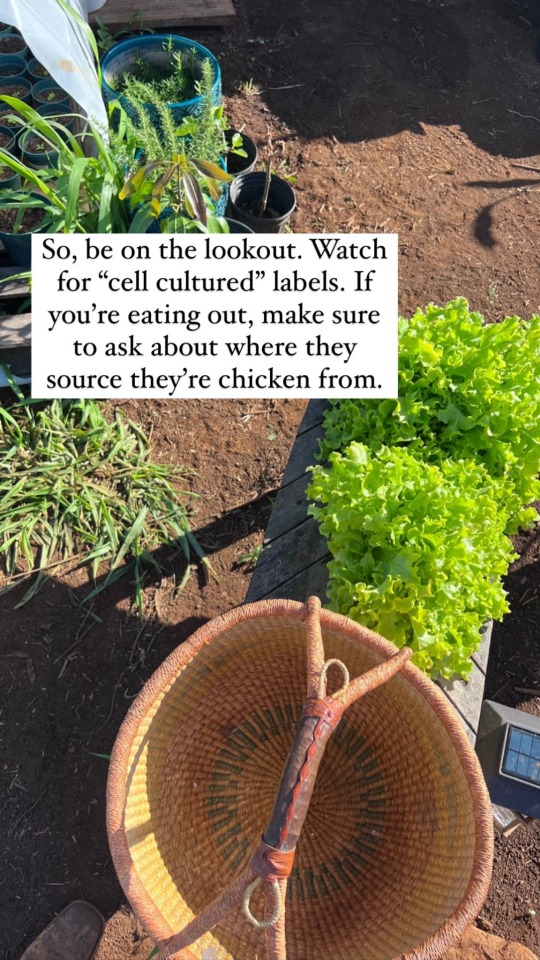
USDA approves ‘lab grown’ meat to be sold to the public from @ vitallymelanie
yesterday I shared a post about the decreasing amount of farmers in the US. The question posed was “who is going to grow the food?” This is the answer from the US govt. Meat created in labs by scientists.
I share this not to instill fear, but so that we can understand the realities and challenges of our food system today. Ideally, this info inspires more folks to get involved with educating others about what’s happening and gets more folks involved in the creation of their food
#if someone wants to type out all the text that would be great cause I’m on my phone#food systems#gardening#farmers#farmers markets#get to know your local farmers
12 notes
·
View notes
Text
Philly cherry blossom festival today :) i hope i can practice sketching before though…
Im planning on making grow your own strawberry kits of my visual thinking final! Im so excited! My chosen path of advocacy has been about better food systems. I think teaching communities how to grow their own foods is a keystone to food advocacy :)
Unrelated pictures of bruce springsteen and comic strip


3 notes
·
View notes
Link
““You can see that this place is full of life,” says Anniqa Law Chung-kiu, conservation project manager for The Nature Conservancy (TNC) Hong Kong, as she carefully treads through the watery mud. “The oyster reef is playing an important role in the local ecosystem.”
The reef she speaks of is new, one of several her team fashioned from the old posts in the mudflats off Pak Nai, a historic hamlet along Deep Bay in Hong Kong’s northern New Territories region. These diverse habitats provide homes for fish and other marine life. Their creation has opened up space for horseshoe crabs, an endangered species dating back 475 million years. They stabilize shorelines in a way that both mitigates coastal erosion and allows seagrass to lay root. And, crucially, they act as filters to clean up the water, cutting the high levels of nitrogen that have led to toxic algae blooms in Hong Kong.
“The value of oyster reefs is proven, but we need to restore them,” Law adds.
TNC’s work is part of a broader project with the University of Hong Kong’s Swire Institute of Marine Science (SWIMS) to restore oyster reefs across the city, where there are now four projects in three areas...
But at Pak Nai, where the reef was established in 2020, the researchers are testing a different approach: reconfiguring abandoned oyster farms instead of starting from scratch, which requires bringing in new substrate for the larvae to grow on. Oyster farmers once grew oysters here on the old concrete posts but abandoned them in the mudflats many years ago after adopting more modern techniques, such as the “off-bottom system,” in which oysters grow on rafts floating in the water.
Law and her colleagues took this leftover substrate to create new reefs, dislodging the old posts from the muck, where they once stood vertically in neat rows, and arranging them in jumbled piles that more closely resemble natural oyster reefs. In the process, they are moving the posts seaward, where the intertidal zone is wetter and oysters thrive, and restoring the landward soft shore and seagrass intertidal habitats to a more natural state.
Their efforts have proven remarkably effective. While most oyster reef restoration projects require seeding with juvenile oysters cultivated in hatcheries, the waters at the four Hong Kong sites teem with so much larvae that the oysters grow independently. The only thing they need is a substrate to attach to, such as the new concrete-post reefs at Pak Nai, which are now encrusted with oysters two years after being established.
“The water has such high levels of larvae, we were blown away by the figures,” says Marine Thomas, TNC’s senior conservation program manager, referring to a feasibility study. “The conditions here allow oysters to thrive all by themselves...”
In addition, oysters have a powerful ability to clean water. [The local oyster species] M. hongkongensis has “among the highest filtration rates recorded of any oyster species,” being able to “filter up to 30 liters [8 gallons] of water an hour in summer temperatures,” which is equivalent to a 7-square-meter (75-square-foot) reef filtering one Olympic swimming pool daily, according to a 2020 study.” -via Mongabay, 12/30/22
#mongabay#mongabay environmental news#environmental news#conservation news#oyster#marine science#conservation#water pollution#food systems#hong kong#good news#hope
97 notes
·
View notes
Text
Reforming the world’s food systems will be a key step in limiting global temperature rises, the UN has said, as it set out the first instalment of a roadmap for providing food and farming while staying within 1.5C.
Food production is highly vulnerable to the effects of the climate crisis, with research suggesting that as much as a third of global food could be at risk from global heating.
Agriculture and livestock farming are also major sources of greenhouse gas emissions, contributing roughly a 10th of global carbon output directly, and more than double that if the conversion of natural habitat to farming is included.
Until now, however, the UN has held back from setting out in detail how the world can both meet the nutritional needs of a growing population, which is forecast to reach 10 billion by 2050, and reduce global greenhouse gases to net zero by the same date. The latter is required to limit global temperature rises to 1.5C above pre-industrial levels.
Maximo Torero, the chief economist for the Food and Agriculture Organisation (FAO), told the Guardian: “We need to act to reduce hunger, and to stay within 1.5C. This is about rebalancing global food systems.”
The roadmap will be laid out over the next two to three years, starting with a document published at Cop28 in Dubai that contains 20 key targets to be met between 2025 and 2050, but little detail on how they can be met. Further detail on how the aspirations can be achieved will be set out in future instalments at the next two Cop summits.
The targets include: reducing methane emissions from livestock by 25% by 2030; ensuring all the world’s fisheries are sustainably managed by 2030; safe and affordable drinking water for all by 2030; halving food waste by 2030; eliminating the use of traditional biomass for cooking by 2030.
Torero said the plan would not include calls for a meat tax, which some experts have advocated, but would examine measures to tax sugar, salt and super-processed foods, and better food labelling.
More climate finance should be devoted to agriculture, he added, which accounts for only about 4% of climate finance today. He also called for much more efficient use of agricultural land and resources.
Emile Frison, an expert at IPES-Food (the International Panel of Experts on Sustainable Food Systems), said: “The FAO should be applauded for this first step in laying out a plan to eliminate extreme hunger and the third of greenhouse gases that come from food systems, and particularly for its emphasis on a just transition – it is not easy.”
But he said the plan did not go far enough. “This current draft puts a huge emphasis on incremental changes to the current industrial food system. But this is a flawed system that is wrecking nature, polluting the environment, and starving millions of people,” he said. “These efficiency-first proposals are unlikely to be enough to get us off the high-pollution, high-fossil-fuel, high-hunger track we are on.”
He called for more radical proposals in the coming instalments. “The next rounds of this process will need to go much further in proposing a real transformation of the status quo, by putting much more emphasis on diversification, shorter supply chains and agroecology, and on tackling the massive power inequalities imposed by a handful of companies that define what we grow and eat.”
Ruth Davis, a fellow at the European Climate Foundation, and senior associate at Oxford’s Smith School, said: “The world desperately needs a roadmap which points us to a fairer, more resilient and sustainable future for food systems. The FAO has made a useful start but it doesn’t take us all the way to the destination we need."
4 notes
·
View notes
Text
Happy solstice and liberation.
Giving thanks for the day.

#winter solstice#solstice#compost#food systems#atlanta urban ag#food access#soil food web#soil health#food sovereignty#vermicomposting#community composting systems#visionarygrowingsolutions#tending to the herbs#simple food small farmz#airbnbexperience#herbs#maurice small
23 notes
·
View notes
Text
#another rec for my fellow podcast enjoyers (first in a series in this case)#podcasts#labor rights#food systems#history#politics#my posts
1 note
·
View note
Text

There is a certain feeling you get when you grow great soil that grows great food.
#soil health#compost#lettuce#onions#atlanta urban ag#raised beds#food systems#food access#biodiversity#permaculture#maurice small
113 notes
·
View notes